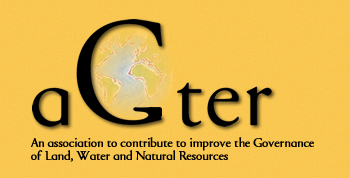|
|
||||||||||||||
|
|
The association AGTER runs an international network of people, exchanging and thinking together how to improve the governance of land, water and natural resources. The network selects and makes information available but it also formulates suggestions and alternatives to face the current great challenges. A quaterly newsletter presents the latest information available on our website : www.agter.asso.fr. Each newsletter is introduced with an editorial written by a member of AGTER’s network. Immediately after Zine El Abidine Ben Ali’s flight on January 14th, 2011, Tunisians were confronted with the complexity of meeting their basic needs, which has been expressed through the refrain "dignity and bread." The gravity of certain realities quickly became evident: for example, water is not only rare but overpriced, this in a country whose economic and agricultural policies, which have been fundamentally unfavorable to family farms, have made them structurally dependent on food imports. Extreme water depletion and pollution threatens to compromise the ability of future generations to meet their needs. Although some questions remain about the scientific community’s knowledge, and about the quality of public statistics (see the article, 27-04-2011), civil society has successfully put forth a number of constructive proposals. The "Manifesto for the inclusion of principals of sustainable and democratic water management in the new constitution" (see the blog) published in June 2011, includes 3 main proposals. The new constitution should recognize that:
The goal is not to underplay or deny what has already been accomplished, but to go further in hopes of guaranteeing everyone both "dignity and bread." Viewing water as part of a shared global heritage encourages all citizens to use it responsibly (which is necessary, if future generations are to benefit from this resource). It also affirms that the state is not its sole proprietor, and is therefore not in a position to freely exploit a resource that belongs to everyone (see Ugo Mattei’s article). The public sector is supposed to serve the interests of the people, not the opposite. In light of current conflicts over water and land in Tunisia—and given the fact that the right to life, the most fundamental of human rights, depends on sustainable water management— it is particularly urgent to include these principles in the new constitution. What is occurring in Tunisia is also occurring elsewhere. AGTER’s research has frequently focused on the growing phenomenon of land grabbing, but "water grabbing" must be addressed as well. Water governance must be seriously re-evaluated. Much is at stake, and powerful stakeholders are involved. This is reflected by the two World Water Forums that were recently held in Marseille, France— one, dominated by transnational corporations, and the other, the Alternative World Water Forum, organized in support of the idea that water is a common good. There is much more work to be done. Processes such as climate change, urbanisation, expanding industry, and the concentration of water resources in few hands must all be addressed immediately. One issue that has been completely ignored by current debates, moreover, is the question of water access for small farmers, herders, and fishers. Through Coordination Sud, AGTER has begun working with three other French NGOs, AVSF (Agonomes et Vétérinaires Sans Frontières), CCFD- Terre Solidaire and GRET, on this issue. Denis Pommier is a founding member and a member of AGTER’s Administrative Council The French, Spanish, and English articles and videos that we present here differ.
|
AGTER. Addres: 45 bis, avenue de la Belle Gabrielle, 94736 NOGENT SUR MARNE CEDEX, FRANCE
Telephone: +33(0)1 43 94 72 59 / +33(0)1 43 94 72 96
E-mail: agter@agter.org




